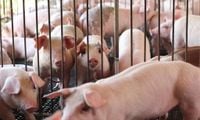Poland is ramping up its defenses against foot-and-mouth disease, a highly contagious viral infection that poses a significant threat to livestock. As of April 6, 2025, the Ministry of Agriculture and Rural Development (MRiRW) confirmed that the country has not recorded any cases of the disease, but is intensifying preventive measures in light of outbreaks in neighboring countries.
The MRiRW stated that strict adherence to biosecurity and prevention principles is essential for all breeders. This decision follows a crisis management meeting held by the ministry, where officials discussed the increasing risk of virus transmission from areas where the disease is present.
The ministry is currently conducting intensive training sessions aimed at educating farmers, breeders, and industry representatives on identifying risk factors and implementing biosecurity measures. These educational efforts are critical as neighboring countries, including Slovakia and Hungary, have reported recent outbreaks.
In a statement released after the crisis meeting, the ministry emphasized the importance of limiting the movement of people and vehicles into farms that house susceptible animals. It also highlighted the necessity for immediate disinfection of vehicles during on-site inspections to prevent any potential spread of the virus.
Furthermore, the ministry has issued a ban on transporting live cloven-hoofed animals, such as cattle, sheep, goats, and pigs, as well as animal products and manure from areas in Slovakia and Hungary that are affected by foot-and-mouth disease. Transport of these animals and products is only permitted through ten designated border crossings.
Animals introduced to farms must come from known sources, and those from outside Poland must have health certificates confirming their origin and health status. Newly purchased animals should be isolated for a minimum of 14 days, preferably 21, before being integrated into existing herds.
To further mitigate risks, the ministry has urged farmers to minimize contact between their animals and other livestock, especially in pastures. They should also ensure that feed and bedding brought onto the farm come from established sources and are stored separately from animals not originating from the farm.
Personal hygiene is another critical focus. Farmers and workers are reminded to wash and disinfect their hands after contact with animals or animal products, change clothing and footwear, and use disinfectant mats at entrances to livestock buildings.
In the event that any signs of infectious disease are observed in animals, such as elevated body temperature, drooling, or lameness, farmers are instructed to immediately report these symptoms to a veterinarian or local authorities and to halt the movement of any animals.
The urgency of these measures is underscored by recent developments in the region. Earlier this year, German veterinary authorities reported the first case of foot-and-mouth disease in 37 years, located approximately 70 kilometers from the Polish border. Fortunately, subsequent testing revealed no further cases in Germany, and restrictions were lifted.
However, the situation remains precarious. On March 31, 2025, the Polish Veterinary Inspectorate reported a second outbreak in Hungary near the borders with Austria and Slovakia. Just a day prior, Slovakia announced its fourth outbreak and declared a state of emergency across the country.
Foot-and-mouth disease is not only dangerous to domestic livestock but also affects wild animals. If an outbreak occurs, all animals in affected farms must be culled to prevent further spread. The last occurrence of foot-and-mouth disease in Poland was recorded in 1971.
In addition to the foot-and-mouth disease crisis, the European Union is grappling with new regulations concerning animal transport, which have become a contentious issue in the ongoing animal welfare reform discussions. During the 16th meeting of the EU Platform on Animal Welfare on March 31, 2025, Aleksandra Fałat, chair of the EU Council working group on animal welfare, presented the current state of negotiations under the Polish presidency.
Fałat indicated that reaching an agreement on the proposed changes in the first half of 2025 is unlikely. The European Commission's draft regulation, introduced on December 7, 2023, aims to enhance animal welfare during transport and includes several key changes.
Among the proposed regulations are limits on transport time for animals destined for slaughter, capping it at nine hours, and banning transport at temperatures exceeding 30 degrees Celsius or falling below -5 degrees Celsius. The total maximum transport time, including breaks, would be set at 42 hours, and there would be a prohibition on transporting calves younger than five months.
Additionally, the regulations would require increased space for animals in transport vehicles to ensure their comfort and well-being. These proposed changes have stirred significant debate among stakeholders in the agricultural sector, with many expressing concerns about the practicality and implications of such regulations.
As Poland navigates these challenges, the focus remains on safeguarding its livestock from foot-and-mouth disease while also addressing the broader issues of animal welfare within the EU framework. The ongoing educational campaigns and stringent biosecurity measures are vital steps in protecting both domestic animals and the agricultural economy.
With Easter approaching, the ministry has advised farmers to consider maintaining a register of visitors and vehicle movements on their farms to further enhance biosecurity. The need for vigilance is paramount as the specter of foot-and-mouth disease looms just beyond Poland's borders.





